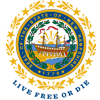Group Net Metering
This page contains information and forms for the New Hampshire Group Net Metering Program.
In 2013, with the enactment Senate Bill 98, New Hampshire established group net metering. This law (RSA 362-A:9, XIV) permits net-metered renewable energy facilities, known as hosts, to share the proceeds from surplus electricity generation with other electric utility account holders, known as group members. Group members do not have net metered renewable energy facilities and do not have to make any changes to their existing electric service.
The Commission developed group net metering rules (Codified in the Puc& 900 rules) that initially went into effect on January 7, 2015. The Puc 900 rules were updated in 2020 to reflect changes from Commission Order No. 26,029 and legislative amendments SB321 (2018), SB367 (2018), and SB165 (2019). The rules specific to Group Net Metering begin on page 33 in PART Puc 909 GROUP NET METERING, though there may be other parts that are applicable, such as the definitions included in PART Puc 902 DEFINITIONS.
Below please find application forms for group net metering as well as a copy of the final group net metering rules, Puc 902 and Puc 909.
Please submit completed forms to: ENGY.GroupNetMetering@energy.nh.gov
- Application Form to Register or Re-register as a Host (Puc 909.09)
- Annual Report Form for Group Hosts (Puc 909.10)
- Traditional Group Host Change Report Form
- Puc 900 Net Metering, including Group Net Metering
- Host/Member agreement checklist
A general overview presentation of Group Net Metering, On-bill Crediting, and the LMI Adder for Low-Moderate Income Community Solar Projects is available below.
An illustrative overview of the current net metering tariff structure is available below. Tariffs are based on the applicable tariff structure of the Host account. Please note that a number of project details impact compensation and customer-generators should work with their utility and/or installer to fully understand net metering compensation specific to their project:
Orders and Statutory Changes impacting Group Net Metering
Commission Order No. 26,029, issued June 23, 2017, in regard to net metering also impacts Group Net Metering in New Hampshire.
House Bill 281 of 2023 (eff. Oct. 7, 2023)
Chapter 233 HB 281 - Final Version
In addition to changes unrelated to net metering, this bill amends the definition of "municipal host" under 362-A:1-a, II-c to remove the requirement that a municipal host under the limited electrical energy producers act be located in the same municipality as all group members.
Senate Bill 161 of 2023 (eff. Sept. 26,2023)
Chapter 166 SB161- Final Version
This bill amends the definition of "low-moderate income community solar project" under RSA 362-F:2, X-a as well as RSA 362-F:2, X to allow certain public housing authority projects to qualify as low-moderate income community solar projects. Such projects may now qualify if they directly benefit the residents of a public housing authority created pursuant to RSA 203 or a housing project as defined in RSA 78-B:2 XXIII, provided those residents directly benefiting are at or below 300 percent of the federal poverty guidelines. Qualifying "low-moderate income community solar projects" are potentially eligible to receive funding through the Renewable Energy Fund as well as additional net metering compensation under RSA 362:A:9.
Senate Bill 270 of 2022
Chapter 329 SB270 - Final Version
This bill establishes a program for certain Low-Moderate Income electric customers (i.e., those enrolled in or on the waitlist for the Electric Assistance Program), to participate in designated eligible Low-Moderate Income Community Solar Projects entitled to receive the 2.5¢ per kWh adder for net export compensation.
Information regarding implementation of SB 270 (2022)
Senate Bill 262 of 2022
Chapter 328 SB262 - Final Version
This bill allows customer-generator that is either a “political subdivision” as defined in RSA 362-A:1-a, II-c or an owner of a facility under RSA 362-A:9, XX to participate as a group member in a group net metering arrangement.
House Bill 1258 of 2022
Chapter 245 HB1258 - Final Version
This bill amends the definition of “political subdivision” under 362-A:1-a, II-c to include the State of New Hampshire for the purposes of the definition of "municipal host."
House Bill 315 of 2021
Chapter 229 HB315 - Final Version
In August 2021 House Bill 315 made certain "municipal hosts" eligible for group net metering even if their renewable energy systems are greater than one megawatt in capacity, provided that the hosts generate electricity to offset the electrical requirements of a group consisting entirely of political subdivisions and meet other specified conditions. A municipal host is defined as a customer generator with a total peak generating capacity of greater than one megawatt and less than 5 megawatts used to offset the electricity requirements of a group consisting exclusively of one or more customers who are political subdivisions, provided that all customers are located within the same utility franchise service territory. A municipal host shall be located in the same municipality as all group members if the facility began operation after January 1, 2021. A municipal host may be owned by either a public or private entity. For this definition, "political subdivision" means any city, town, county, school district, chartered public school, village district, school administrative unit, or any district or entity created for a special purpose administered or funded by any of the above-named governmental units.
Senate Bill 165 of 2019
Chapter 271 SB165 - Final Version
In 2019 Senate Bill 165 enabled member on-bill crediting as a method for allocating the host's net metering credits. It also specifies a 3 cent per kwh addition from July 1, 2019 through July 1, 2021, and a 2.5 cent per kwh addition thereafter for net metering credits produced by approved Low-Moderate Income Community Solar Projects.
Senate Bill 367 of 2018
Chapter 112 SB367 - Final Version
In 2018 the adoption of Senate Bill 367 removed the annual report requirement for hosts with residential systems with maximum generation capacity less than 15 kilowatts(kW) AC. Customers with systems below 15kW AC are still required to register as group hosts, but no longer need to submit an Annual Group Host Report.
Senate Bill 321 of 2018
Chapter 212 SB321 - Final Version
Senate Bill 321 of 2018 removed the requirement that group members and hosts must be on default energy supply. Group hosts and members of the group still must be customers of the same distribution utility but are now able to take energy supply from a retail competitive electric power supplier. It is important to note that group hosts who take energy supply service from a retail competitive electric power supplier are not eligible for the Default Energy Service portion of the Group Host Credit. Group hosts should contact the retail competitive electric power supplier directly to understand if, and how, net metered energy supply may be compensated by the supplier.
Please direct any questions about the group net metering forms to the Consumer Services Division 603-271-3670. For other questions regarding group net metering, please contact the Sustainable Energy Division, 603-271-3670. You can also direct questions to ENGY.GroupNetMetering@energy.nh.gov.



